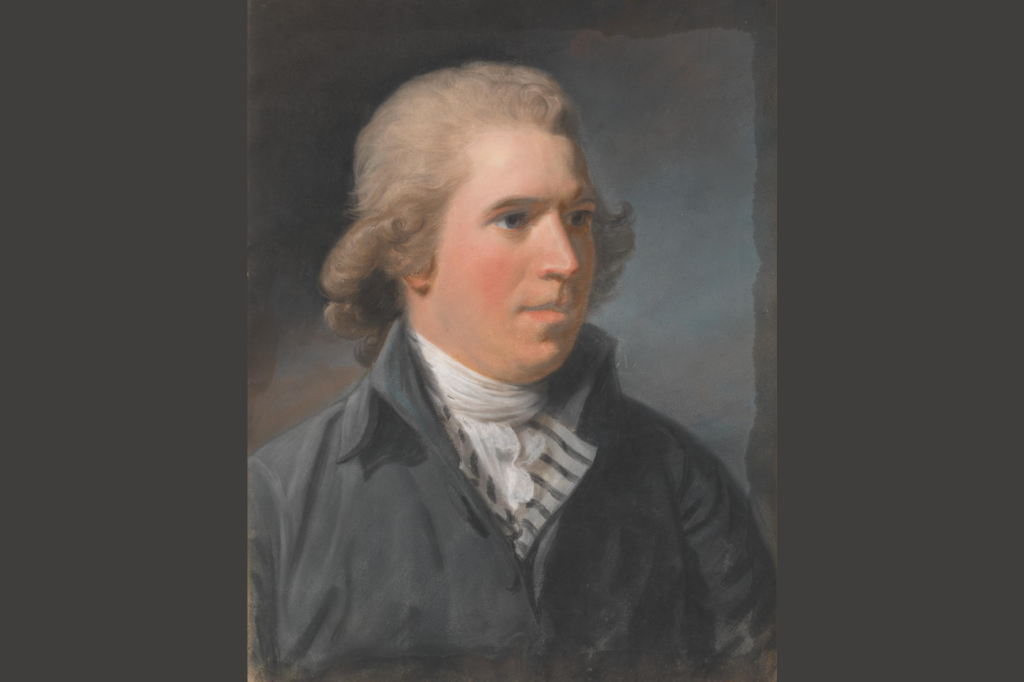As I argued in yesterday’s essay, Yoram Hazony’s outstanding new Conservatism: A Rediscovery makes an invaluable contribution to the ongoing post-2016 intellectual ferment on the American right-of-center. Those who share its general outlook, as I do, can find in it both challenges and unresolved questions.
Burke in America
Reverence for national traditions is an essential part of Hazony’s Burkean conservatism. Yet in the unusual American nation, our national traditions appear to include a healthy dose of liberal theory. How should we honor our ancestors if our ancestors told us not to?
Hazony addresses this concern by tracing his conservative political theory’s intellectual lineage. After showing the theory’s British roots in Fortescue, Selden, Hooker, and Burke, he describes the theory’s American instantiation in (he claims) the early Federalist Party. We American conservatives may never quite be able to revere Jefferson and Paine, but at least we have Washington, Adams, Morris, Marshall, and one half of Madison, as well as their great British tutors.
Start your day with Public Discourse
Sign up and get our daily essays sent straight to your inbox.I hope that Hazony’s work—like that of our other politically prominent Burke scholar, Yuval Levin—will encourage conservatives to disentangle their own Burkeanism from the theoretical liberalism of Locke or Paine. Still, Burke was no American. Hazony’s book reveals some of the ineradicable difficulties facing any project of American Burkeanism.
Burke never wrote a “philosophy of political order, which investigates human nature and the nature of human societies wherever our experience reaches, . . . in all times and places.” (This is Hazony’s description of the core of his own book.) Burke would at least have warned against trying to deduce a political program from any such theory. Burkean arguments about politics ought, in Hazony’s own words, to be “made with reference to practical issues and framed in terms of inherited principles,” not derived from general philosophical theories.
And how does Hazony treat our own nation’s “inherited principles”? Of the many Biblically grounded aspects of our national traditions, he offers some much-needed reminders. (He compiles some choice FDR quotes about “God-fearing democracy” that FDR’s own party today would condemn as theocratic.) On other American “inherited principles,” such as those stated in the Declaration of Independence, Hazony is conspicuously silent. His selective reading of our tradition seems to be governed by his Biblical and theoretical convictions, which are eminently defensible on their own terms. But such an approach is not Burke’s.
For Burke was more elitist than Hazony. Burke thought that the principles to guide sound statesmanly action, acquired only through long experience and deep reflection, could never be conveyed to the reading public. Burke hated all “-isms”: ideological theories that give non-practitioners the illusion of having ready answers to difficult policy problems. Burke defended, not “conservatism,” but statesmanly prudence and the traditional English constitution. Yet Americans love their “-isms” and hate elitists. (Burke would have despised the Jim Crow system, but I suspect he would have admitted that maintaining that system was the conservative policy—and then added that the prudent statesman does not always choose the conservative policy.)
Burke was also more pessimistic. He did not share Hazony’s characteristically American hope that Biblical teshuva, repentance, can be accomplished on a national scale. Burke emphasized that it is hundreds of thousands of times easier to destroy a healthy tradition than to build a new one. He sought only to convince Englishmen to hold on to the living traditions that they still maintained.
By muting the most anti-American parts of the Anglo-conservative tradition, Hazony deprives his brightest young readers of the chance to confront older thinkers whose critiques can reveal some of our American tradition’s innate weaknesses.
And for Burke (along with his predecessors back to Fortescue), those traditions included hereditary monarchy, hereditary aristocracy, primogeniture, a fully established national church, moderate patriarchy, and discrimination against Jews. Burke had arguments for each of those institutions, but he also defended them as the objects of national “prejudice,” which he thought should be treasured prior to any intellectual argument. Hazony, quite reasonably, defends neither these un-American institutions nor prejudice as such.
Hazony’s long summary of the Anglo-conservative tradition thus manages to avoid or minimize the most un-American aspects of that tradition. This is, of course, thoroughly in the spirit of Burke’s own reverence for national prejudices. But in that same spirit, it seems to me that Hazony might spare a few kind words for the Declaration of Independence, and more generally for a non-Lockean interpretation of the American natural rights tradition.
Since Americans will insist on having their -isms, Hazony’s Americanized Burkeanism may well be the best available. But the effort to repackage serious political thought for public consumption involves trade-offs. By muting the most anti-American parts of the Anglo-conservative tradition, Hazony deprives his brightest young readers of the chance to confront older thinkers whose critiques can reveal some of our American tradition’s innate weaknesses. When students do confront those arguments, they learn to follow Tocqueville in seeking to mitigate our regime’s unavoidable deficiencies—rather than leaning into those deficiencies, as a national populist movement tends to do.
The Limits of Theory in Practice
More urgently, Hazony seems to me mistaken in claiming that the Federalist Party ever embodied non-Lockean conservative theory, let alone that it offers us a “relevant model” for how that theory should apply to our politics today. If Burke is right, there can never be such an embodiment. Theory never translates directly into practice. Ideas do not have those kinds of consequences.
The Federalists, like Locke, were anti-agricultural. A truly conservative society should be agricultural, as Hazony has previously shown. The Federalists, like Locke, supported the development of national industry. That development destroyed the multigenerational home economy that Hazony identifies as the backbone of a conservative society, replacing it with the more atomized Lockean nuclear family. The Federalists, like Locke, supported national sovereignty against states’ rights. Burke insisted that successful nationalism must be grounded on localism rather than opposed to it. The Federalists, like Locke, wanted a strong national judiciary. As Hazony shows, any recovery of a healthy public role for religion today will have to take place at the local level rather than the national, and will require a rollback of federal judicial overreach. And while the Federalists wanted tighter controls on immigration, many of today’s illegal immigrants may share more of Hazony’s views on family structure than the average reader of his book.
This tension between the Federalist Party on the one hand, and conservative political theory on the other hand, is reflected in Hazony’s own stated hopes for a new national-conservative political program. On the one hand, he wants industrial revival, a more competent federal government, and strong competition with a rising China. (Peter Thiel blurbed this book.) On the other hand, he wants family-friendly labor markets, socially conservative morals legislation, and a retreat from endless war. (Rod Dreher also blurbed this book.)
Neither Hazony’s nor any other philosophical theory will tell us how our politics should balance the inevitable tradeoffs among all these genuine goods. Yet in that balancing lies the real work of public policy. An anti-Lockean conservative can reasonably defend the Federalist Party’s Lockean policies even today, but this only confirms the Burkean point that what is wrong in theory may be right in practice.
Indeed, Hazony’s critique of Lockean liberal theory is at its strongest when he shows how would-be Lockeans always end up filling in their theory’s abstractions with traditional doctrines that cannot be squared with the theory. Loud proclamations of egalitarianism mask our unavoidable and all-pervasive social hierarchies. Appeals to self-evident truths mask our unconscious adoption of “the ideas and thoughts of important persons” within those same hierarchies. Supposedly universalistic rationalism masks our reliance on “inherited conceptions . . . and inherited norms.” In observing that “Enlightenment liberalism” tends to “destroy its own foundations in the name of reason,” Hazony admits that even liberalism has conservative foundations.
If an American Burkean can reject hereditary aristocracy, then surely an American Lockean can conserve the healthy traditions that Jefferson and Locke appear to have taken for granted.
Yet Hazony appears to forget this insight when he claims that Lockean liberalism cannot defend national borders, or controls on immigration or emigration, or adults’ obligation to honor their parents, or the obligation to pay taxes or perform military service, or the existence of selective universities, or even the distinction between men and women. Since John Locke in fact believed in all those things, Hazony’s thought appears to be that Locke had no right to do so. The hypothetical cosmopolitan rationalist who is Hazony’s constant sparring partner would never have begun his own political theory with a sentence like this: “Slavery is so vile and miserable an estate of man, and so directly opposite to the generous temper and courage of our nation, that ’tis hardly to be conceived that an Englishman, much less a gentleman, should plead for’t.”
I agree with Hazony that a consistent Lockeanism is impossible, or that every would-be Lockean is also an anti-Lockean. But for that very reason, one need not be so hard on would-be Lockeans. If an American Burkean can reject hereditary aristocracy, then surely an American Lockean can conserve the healthy traditions that Jefferson and Locke appear to have taken for granted. This may be why Burke never attacked the theories of natural rights and the state of nature: he only attacked a revolutionary interpretation of those theories. Burke had no objection to conveying his non-Lockean ideas by appropriating and reinterpreting Lockean terminology, if that would get the point across.
The Challenges of the Conservative Life
All the difficulties of political Burkeanism suggest that when Burkean ideas have consequences for us, they are first and foremost consequences for our personal lives. Hazony therefore deserves credit for his singularly forceful insistence that all our conservative theorizing will be “of limited worth” unless readers put it into practice by “living a conservative life.” Each of us ought to live as part of a local conservative community, an “alliance of families” in which human flourishing is fostered through common practices of honor, loyalty, virtue, and religion. And “in our time and place, there are virtually no [such] conservative communities left outside of orthodox Christian and Jewish congregations.” (Hazony is silent on Islam.)
Some readers may object that they cannot join such a congregation until they first share its religious faith. Hazony rejoins:
It is not disbelief that plagues us but dishonor: our accursed inability to give honor where it is due. A conservative knows—or at least suspects—that if he were to give honor where it is due, then knowledge of God, and of many other things, would eventually follow from this. Where honor is possible, so too is belief.
This is powerful advice, and I hope it will be taken to heart by many of the “new generation of conservatives” to whom Hazony addresses it. If so, then they will be confronted with a new set of challenges, which I hope Hazony and his readers will write more about in the future.
For example: given the centrality in Hazony’s thought of the duty to honor one’s parents, how should young conservatives relate to their more liberal parents? Should they, for example, raise children in a like-minded religious community even if that means raising them far from grandparents? Hazony speaks eloquently of the need for a conservative society to restrain adolescent rebellion—yet when describing his own heady discovery of conservative principles as an undergraduate, he finds himself nostalgically blockquoting Springsteen’s “Thunder Road.” His book’s very subtitle reminds us that today’s traditionalists are almost all neo-traditionalists, recovering ancestral traditions through rebellion against their own more recent ancestors. In such a situation, traditionalism can offer only imperfect (if still indispensable) guidance.
Second, Hazony movingly describes his adoption in college by an “attractive, intimate, and inspiring congregation” of Orthodox Jewish students, whom he began by eating with and eventually ended up praying with as well. Before that, the young Hazony “hadn’t succeeded” in keeping “the Sabbath and the traditional Jewish dietary laws,” even though he knew he should. It seems that overcoming our “accursed inability to give honor where it is due” requires help from an attractive community, animated by genuine faith, whose social benefits can also draw in those whose faith is not yet strong enough for communal worship. Hazony’s book ought to inspire religious conservatives to think long and hard about how to build such communities today. (I am partial to the idea of forming them around religious classical schools.)
Third, Hazony somewhat misleadingly suggests that “leading a conservative life” will also qualify one to be a successful leader of the burgeoning national-conservative political movement. But the mass of voters attracted to that movement hardly seem to share Hazony’s conservative revulsion at a “dissolute politics” dominated by “vile expressions of contempt, disgust, distrust, and hatred” for one’s political rivals. Hazony does not make clear how much he thinks this ugly situation can ever improve. Certainly his readers must follow his own lead in living a conservative life regardless of whether it leads them to political success or “political exile.”
Finally, Hazony never describes how “living a conservative life” ought to affect our use of technology. Indeed, his book says remarkably little about technology’s role in destroying conservative ways of life: his discussion of the Sexual Revolution does not even mention the Pill. If tomorrow’s economic revival should turn out to require even greater use of the digital technologies that are already doing so much to undermine conservative sentiments of loyalty and trust, then a conservative would have to evaluate whether such a revival would even be worth the cost. But either way, Hazony’s insights will be of great value to anyone who seeks to use those technologies more carefully and selectively than most of our fellow Americans ever will.
As in politics, so in our personal lives: the thoroughly ancestral “conservative society” of Hazony’s description is gone past recovery. Failure to foresee its collapse is the one error that Tocqueville attributed even to the wise Burke. Nonetheless, by explaining that lost society’s intrinsic excellence, Hazony has done conservatives an indispensable service. A theory like his is the first step—but only the first step—toward approximating a “conservative society” as our circumstances permit, while navigating the inevitable tradeoffs that those circumstances force on us.













